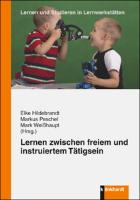Lernen zwischen freiem und instruiertem Tätigsein
| dc.contributor.editor | Hildebrandt, Elke | |
| dc.contributor.editor | Peschel, Markus | |
| dc.contributor.editor | Weißhaupt, Mark | |
| dc.date.accessioned | 2021-10-22T09:52:02Z | |
| dc.date.available | 2021-10-22T09:52:02Z | |
| dc.date.issued | 2014 | |
| dc.identifier | ONIX_20211022_9783781519978_2 | |
| dc.identifier | OCN: 1288652045 | |
| dc.identifier.uri | https://library.oapen.org/handle/20.500.12657/51129 | |
| dc.description.abstract | Starting from an examination of the concept of being active - as a prerequisite for learning processes - this volume discusses the significance of freely chosen versus instructed activities and places them in the contexts of teaching and learning workshop work. The juxtaposition of instructed and free activity challenges us to determine more precisely the relationship between instruction and successful construction in the interaction between learning facilitator and learner. This applies to work in learning and research workshops, in learning labs and in learning in the "normal" seminar room or classroom. All in all, the question arises: Can the activity of discovering, researching, practice-oriented and cross-discipline learning be made one's own in such a way that it becomes habitual learning? And: should it do so at all? | |
| dc.language | German | |
| dc.relation.ispartofseries | Lernen und Studieren in Lernwerkstätten | |
| dc.subject.other | Lernen | |
| dc.subject.other | Lehrerausbildung | |
| dc.subject.other | Lehrerbildung | |
| dc.subject.other | Lernwerkstatt | |
| dc.subject.other | Hochschule | |
| dc.subject.other | Professionalisierung | |
| dc.subject.other | Pädagogisches Handeln | |
| dc.subject.other | Lernprozess | |
| dc.subject.other | Instruktion | |
| dc.subject.other | Lernort | |
| dc.subject.other | Lernumgebung | |
| dc.subject.other | Lernmethode | |
| dc.subject.other | Wahlfreiheit | |
| dc.subject.other | Konstruktion | |
| dc.subject.other | Konstruktivismus | |
| dc.subject.other | Lernbegleitung | |
| dc.subject.other | Hochschulbildung | |
| dc.subject.other | Forschendes Lernen | |
| dc.subject.other | Entdeckendes Lernen | |
| dc.subject.other | Primarbereich | |
| dc.subject.other | Vorschulalter | |
| dc.subject.other | Praxisbezug | |
| dc.subject.other | Spielerisches Lernen | |
| dc.subject.other | Lernforschung | |
| dc.subject.other | Lernaktivität | |
| dc.subject.other | Lernpsychologie | |
| dc.subject.other | Elementarbildung | |
| dc.subject.other | Lernform | |
| dc.subject.other | Experiment | |
| dc.subject.other | Schweiz | |
| dc.subject.other | Deutschland | |
| dc.subject.other | Learning | |
| dc.subject.other | Teacher education | |
| dc.subject.other | Teacher training | |
| dc.subject.other | Teachers' training | |
| dc.subject.other | Learning workshop | |
| dc.subject.other | Higher education institute | |
| dc.subject.other | Professionalization | |
| dc.subject.other | Learning process | |
| dc.subject.other | Educational setting | |
| dc.subject.other | Educational Environment | |
| dc.subject.other | Learning environment | |
| dc.subject.other | Learning method | |
| dc.subject.other | Learning techniques | |
| dc.subject.other | Freedom of choice | |
| dc.subject.other | Construction (Process) | |
| dc.subject.other | Higher education | |
| dc.subject.other | University level of education | |
| dc.subject.other | Discovery learning | |
| dc.subject.other | Primary education | |
| dc.subject.other | Primary level | |
| dc.subject.other | Pre-school age | |
| dc.subject.other | Preschool age | |
| dc.subject.other | Practice relevance | |
| dc.subject.other | Learning by playing | |
| dc.subject.other | Research on learning | |
| dc.subject.other | Learning Activities | |
| dc.subject.other | Learning psychology | |
| dc.subject.other | Psychology of learning | |
| dc.subject.other | Early childhood education and care | |
| dc.subject.other | Form of learning | |
| dc.subject.other | Switzerland | |
| dc.subject.other | Germany | |
| dc.subject.other | Playing | |
| dc.subject.other | Practice | |
| dc.subject.other | Academic studies | |
| dc.title | Lernen zwischen freiem und instruiertem Tätigsein | |
| dc.type | book | |
| oapen.abstract.otherlanguage | Ausgehend von einer Auseinandersetzung mit dem Begriff des Tätigseins – als Voraussetzung für Lernprozesse – wird in diesem Band die Bedeutung frei gewählter gegenüber instruierter Tätigkeiten diskutiert und in die Kontexte Unterricht sowie Lernwerkstatt-Arbeit gestellt. Die Gegenüberstellung von instruiertem und freiem Tätigsein fordert heraus, das Verhältnis von Instruktion und gelingenden Konstruktionsleistungen in der Interaktion zwischen Lernbegleitung und Lernendem genauer zu bestimmen. Dies gilt für die Arbeit in Lern- und Forschungswerkstätten, in Lernlaboren und beim Lernen im ganz „normalen“ Seminarraum oder Klassenzimmer. Insgesamt stellt sich die Frage: Kann man sich die Tätigkeit des entdeckenden, des forschenden, des praxisorientierten und des Disziplinen überschreitenden Lernens so zu eigen machen, dass es in habituelles Lernhandeln übergeht? Und: Soll es das überhaupt? (DIPF/Orig.) | |
| oapen.identifier.doi | 10.35468/5375 | |
| oapen.relation.isPublishedBy | 9a084ee3-3f86-4be2-81d6-89c9fbc5f173 | |
| oapen.relation.isFundedBy | 6e04c2cf-884e-4d7f-aa48-bf1f345537dd | |
| oapen.relation.isbn | 9783781519978 | |
| oapen.relation.isbn | 9783781553750 | |
| oapen.pages | 215 | |
| oapen.place.publication | Bad Heilbrunn | |
| oapen.grant.number | [grantnumber unknown] |

